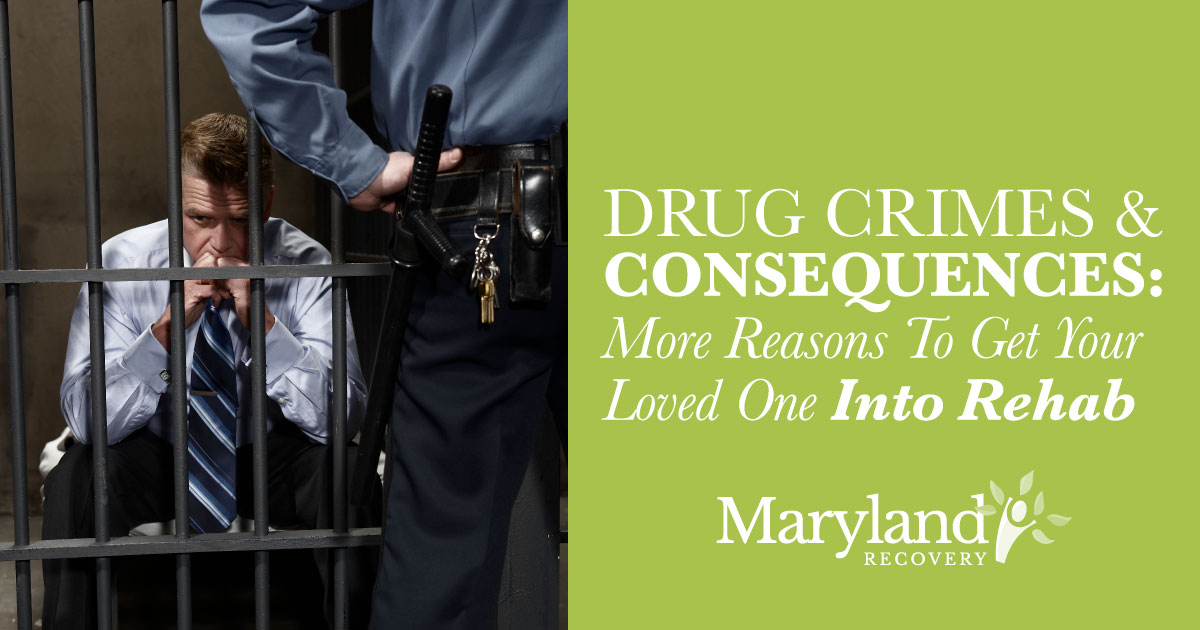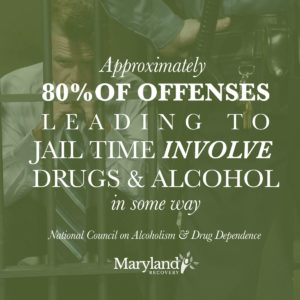 As the friend or family member of a person struggling with addiction, you are constantly put in tough positions. You want to see your loved one get help, but it’s easy to hesitate or put off the process of entering rehabilitation.
As the friend or family member of a person struggling with addiction, you are constantly put in tough positions. You want to see your loved one get help, but it’s easy to hesitate or put off the process of entering rehabilitation.
Unfortunately, the risk of committing drug crimes is a constant threat when someone is battling a chemical dependency. The longer treatment is delayed, the more likely it is that legal issues will arise.
Addiction and Crime
One of the most significant risks of drug and alcohol use is the connection between drug use and criminal activity. According to the National Council on Alcoholism and Drug Dependence, about 80 percent of offenses leading to jail time involve drugs and alcohol in some way. Another 60 percent of incarcerated individuals tested positive for illegal drugs at the time of their arrest.
The most common drug-related offenses include:
- Property Crimes, such as Trespassing
- Driving While Intoxicated
- Juvenile Crimes
- Violence in College
- Domestic Violence
- Child Abuse
- Public-Order Offenses
- Drug Offenses
Drug addiction can often lead to financial ruin. A person with an addiction might resort to crimes such as robbery or mugging to get the funds for their next fix. If you or a loved one is convicted for committing a drug-related crime, the process of getting into recovery will be much more difficult.
Consequences of Drug-Related Criminal Activity
The relationship between drug addiction and criminal activity is complex. Many people with addictions to illegal drugs only commit drug-related crimes, suggesting that their criminal activity is directly related to the drug problem. However, at more advanced levels of drug abuse, some substances appear to amplify the user’s tendencies toward illegal activity.
Overall, there appear to be three main reasons most drug abusers commit crimes:
- The Effects of the Drug: In some cases, the psychological effects of a drug can influence the user to commit a crime. One example of this phenomenon is murder cases involving persons high on bath salts. In these types of cases, it’s safe to assume that the individual likely would not have committed the crime were it not for their drug addiction.
- The Need to Purchase More Drugs: Many drug-related crimes stem from the need to fuel the drug habit after financial ruin. Theft and prostitution are common crimes related to chronic drug use.
- Drug-Related Activities: Many arrests result from the use, possession or distribution of the drugs. Individuals are at much higher risk of incarceration when their crimes are related to the manufacture, trafficking and sale of drugs.
Drug-related crimes can lead to life-changing repercussions. You or a loved one could face court hearings, probation periods and possible jail time for drug-related criminal charges. Unfortunately, many state penitentiaries and prisons lack the resources needed properly care for those struggling with addiction.
You or your loved one may never feel like today is the right day to quit. But you also know that the sooner a person starts treatment, the less likely they will run into trouble with the law.
Choose Rehab Sooner Rather than Later
 You do not want your loved one to go through withdrawal in jail. Avoiding this scenario must be a top priority for your family. Since 2015, several Americans have died from opioid withdrawal symptoms while in jail.
You do not want your loved one to go through withdrawal in jail. Avoiding this scenario must be a top priority for your family. Since 2015, several Americans have died from opioid withdrawal symptoms while in jail.
One poignant case is that of 18-year-old Victoria Herr. She passed away in a Pennsylvania jail after incarceration for drug charges.
According to reports, the jail denied Victoria medical care for heroin withdrawal. She collapsed, stopped breathing and lost brain function four days after her arrest.
Victoria’s case is just one example of what can happen to someone struggling with addiction when their legal issues catch up with them. It can be easy to think that jail time might be good for your loved one. You expect the experience to inspire your loved one and get them to seek help.
The reality is, however, that people still die from withdrawal while serving time for minor crimes.
Don’t let your loved one suffer the same fate. It is much easier to go through rehab and enjoy long-term recovery without legal interference and a criminal record. Now is the time to push for treatment, not later.
Act Before It’s Too Late
Once your loved one is placed into the legal system, he or she will have far less control over the quality of treatment delivered. The court may require enrollment in a subpar state program or mandate a treatment schedule that fails to address the individual’s unique needs.
Not all treatment centers are equal. The wrong type of treatment can hurt, not help, your loved one.
The answer to the looming threat of drug crimes is simple. Act now to get your loved one into a dependable rehabilitation and treatment center. Maryland Recovery Center is a renowned treatment center near Baltimore that is highly equipped to handle the unique needs of each patient we see.
Our mission is to help your loved one before legal consequences make matters worse. It may never seem like “the right time” for someone to enter rehab, but in reality, there is no time like the present. Learn about our programs to get one step closer to helping your friend or family member find the care they desperately need.
Reviewed by Christopher Schwartfigure MS, LGPC, CAC-AD








